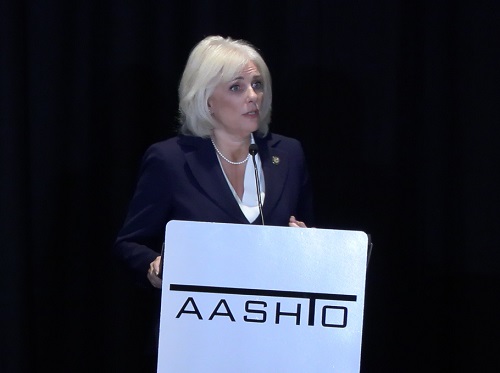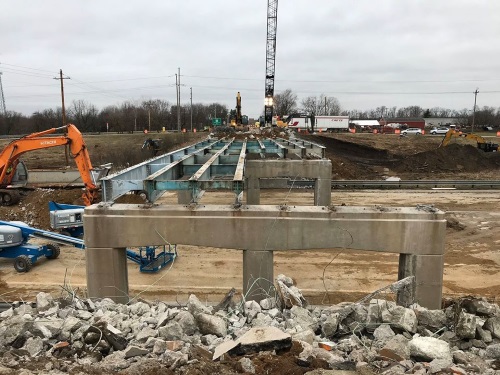As President Trump and members of Congress tout the possibility of pulling together a national infrastructure investment package, several states are already gearing up to continue and in some cases speed up a wide variety of transportation projects.
[Above photo by the Michigan DOT.]
The president supported a $2 trillion infrastructure investment stimulus bill in a March 31 tweet; support echoed by Rep. Peter DeFazio, D-Ore, chair of the House of Representatives Transportation and Infrastructure Committee, during an April 1 conference call with Democratic congressional leaders.
Jim Tymon, executive director of the American Association of State Highway and Transportation Officials, pointed out in a video interview that as the temperatures turn warmer across the country, the highway construction season is “really starting in most states” and that most state departments of transportation are moving forward with planned transportation projects.
The concern for state DOTs, however, is that falling traffic volumes will reduce motor fuel tax revenues they rely upon to fund such infrastructure projects.
For example, most recent traffic flow data compiled by INRIX shows that personal travel dropped between 38 percent and 44 percent nationally through the week ending March 27. As a result, preliminary projections from state DOTs show at least a 30 percent decline on average in fuel tax revenues for the next 18 months, AASHTO’s Tymon noted.

“This is why Congress should provide immediate revenue support to state DOTs as a critical backstop in order to prevent major cuts in near-term transportation funding to prevent cancelling or delaying projects and to help stave off potential job losses both in the private sector and at state DOTs as well,” he said.
Yet states continue their work to keep the nation’s transportation network open and operational, some for the time being forging ahead with infrastructure projects.
Connecticut, for example, is planning to move forward with more than $700 million in infrastructure projects aimed primarily at fixing the state’s aging highways, bridges, and rail lines.

“Even during this unprecedented pandemic, state government and its operations must continue to operate, and the state has an obligation to ensure proper investments are being made, and the timing could not be more crucial,” explained Chris McClure, spokesman for the budget office of Governor Ned Lamont (D), in a news story on April 1.
Meanwhile, the Florida Department of Transportation is accelerating work on $2.1 billion worth of critical transportation infrastructure projects in part due to a reduction in traffic throughout the state as a result of COVID19 while also providing much needed jobs to the construction industry, according to Kevin Thibault, the agency’s secretary.
“The Governor understands that Florida’s transportation system is the backbone of our economy and FDOT is proud to accelerate projects, which will help expedite goods to market and provide much needed jobs throughout the state,” he noted in a statement.

“Safety is our top priority, so we will continue to ensure that employees have the sanitation supplies needed to follow the guidance from the CDC [Center for Disease Control] and work with our industry partners to implement these same precautions to keep workers safe and healthy,” Thibault added.
The Kentucky Transportation Cabinet is making a similar move where the $35 million New Dixie Highway Project is concerned, as reductions in daytime traffic volume due to the COVID-19 pandemic are allowing work crews to move their work into daylight hours – a shift that will improve the quality of work, allowing crews to better see all indents and imperfections in the roadway surface.
“We are so appreciative of all the work the crews are doing during this time, maintaining as much social distance as possible while also working to complete the project,” John Callihan, the project’s manager, explained in a news story.
In the north, the Minnesota Department of Transportation noted on April 2 that it will undertake 188 road and bridge projects statewide during the 2020 construction season, while working on another 66 projects to make improvements to airports, ports, transit and railroads that are outside of the state road construction program.

“It is critical that MnDOT continue its work to maintain and improve our state’s transportation infrastructure,” said Margaret Anderson Kelliher, the agency’s commissioner, in a statement.
“A safe, reliable and multimodal transportation system is essential to keeping our state running in times of crisis,” she added. “MnDOT construction projects will continue as scheduled and within the guidance set by state and federal health officials to prevent further spread of COVID-19. We are especially grateful to our employees and partners in labor and the private sector for working together and prioritizing safety for workers on project sites.”
For similar reasons, Michigan Governor Gretchen Whitmer (D) reiterated in an executive order on April 1 that Michigan Department of Transportation projects will continue unless it is determined that there are COVID-19 concerns that precipitate a delay or shutdown.

Local agency and other critical infrastructure projects can also proceed, if the local government owner deems the project essential with the above public health conditions and precautions also being respected, according to a statement by the Michigan Infrastructure & Transportation Association.
To that end, the American Road & Transportation Builders Association and its partners in the Construction Industry Safety Coalition recently developed a suite of guidance materials designed to assist contractors in safely performing essential construction activities during the COVID-19 pandemic.
“During this unprecedented health crisis, this information will help construction contractors to keep working on key projects while also helping them educate their employees about safe project sites and practices,” explained Bradley Sant, ARTBA’s senior vice president for safety and education, in a statement.

Finally, the South Carolina Department of Transportation is moving forward with $3.2 billion worth of construction projects statewide; part of the agency’s 10-year strategic plan to address a 30-year backlog of deferred roadway system maintenance.
So far, Christy Hall – SCDOT secretary – said in a news story that her agency has improved nearly 400 miles of roads, with a goal of improving 1,000 miles of roads over the next decade. The department has also addressed repair issues on more than 110 bridges, with a target of fixing 465 bridges over the next 10 years.
“This is one of the things we see in times like this – state DOTs providing essential services, making sure our transportation network is up and running and ensuring our supply chain is functioning the way it should; getting groceries on people’s shelves and medical supplies and equipment to hospitals,” AASHTO’s Tymon noted in his video interview. “State DOT employees are on the front lines, providing an essential service that is keeping this country together.”
 Top Stories
Top Stories
State DOTs Call for Action at 2nd Annual Safety Summit
October 18, 2024 Top Stories
Top Stories

